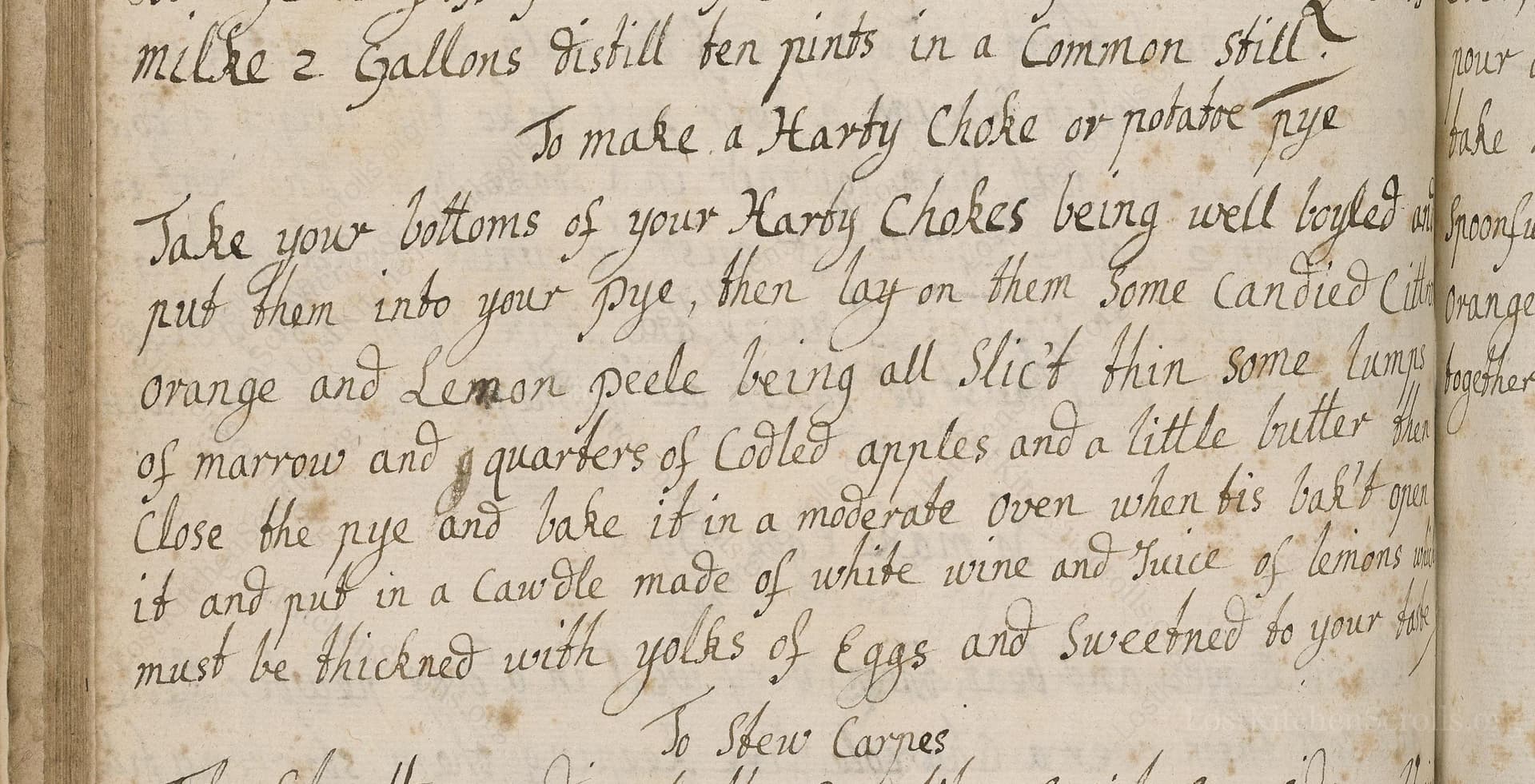To Make A Harty Choke Or Potatow Pye
From the treasured pages of Receipt book
Unknown Author

To Make A Harty Choke Or Potatow Pye
"Take your bottoms of your Harty Chokes being well boyled and put them into your pye, then lay on them some candied Cittron orange and Lemon peele being all slic't thin some lumps of marrow and quarters of Coddled apples and a little butterr then Close the pye and bake it in a moderate oven when 'tis bak't open it and put in a cawdle made of white wine and Juice of lemons wch must be thickned with yolks of Eggs and Sweetned to your taste"
Note on the Original Text
The recipe uses period spelling and shorthands, such as ‘Harty Choke’ for ‘artichoke’ and ‘pye’ for ‘pie’. Instructions are brisk, assuming the reader has culinary knowledge and omitting quantities, precise times, or temperatures. ‘Cawdle’ refers to a thickened, sweetened, egg-based sauce—common in the era. The lack of exact measurements reflects both oral tradition and the expectation that household cooks exercised informed judgment. 'Coddled apples' simply means gently cooked until just soft.

Title
Receipt book (1700)
You can also click the book image above to peruse the original tome
Writer
Unknown
Era
1700
Publisher
Unknown
Background
A delightful glimpse into the kitchens of the early 18th century, this historic culinary manuscript promises a feast of recipes, remedies, and perhaps a pinch of mystery. Expect both practical fare and elegant inspiration for the curious cook.
Kindly made available by
Folger Shakespeare Library
This recipe hails from early 18th-century England, around 1700. It exemplifies the period's fascination with bringing together sweet, tart, and rich flavors in one luxurious pie, often reserved for the tables of the upper classes. The combination of artichoke hearts, preserved citrus, apples, and marrow is typical of the Baroque fondness for extravagant and intricate ingredients, many of which were imported and costly. The recipe reflects both the taste trends and the status-signaling foods of its time.

Back in 1700, the cook would use a large, heavy pot for boiling vegetables and apples, a sharp knife for slicing candied peels, and a pie dish often made of ceramic or metal. The pastry would be rolled out with a wooden rolling pin. Baking would be done in a brick or stone oven, likely heated by wood or coal, and temperature control would be judged by experience. A small pan with a handle would be used to make the caudle sauce over a gentle fire.
Prep Time
35 mins
Cook Time
45 mins
Servings
6
We've done our best to adapt this historical recipe for modern kitchens, but some details may still need refinement. We warmly welcome feedback from fellow cooks and culinary historians — your insights support the entire community!
Ingredients
- 4-6 globe artichoke bottoms (about 10.5 oz total), boiled until tender
- 1.5 oz candied citron peel, thinly sliced
- 1.5 oz candied orange peel, thinly sliced
- 1.5 oz candied lemon peel, thinly sliced
- 1.75 oz beef marrow (substitute: 1.75 oz unsalted butter)
- 2 tart apples (about 7 oz), cored, peeled, and quartered, coddled
- 1 oz unsalted butter
- 9 oz shortcrust or puff pastry (for lining and covering pie dish)
- 4.25 fl oz dry white wine
- 1 fl oz freshly squeezed lemon juice
- 3 egg yolks
- 1.5-2 oz caster sugar (to taste)
Instructions
- Begin by boiling the bottoms of globe artichokes (the fleshy heart) until tender.
- Set these as the base in a pastry-lined pie dish.
- Next, scatter over thin slices of candied citron, candied orange peel, and candied lemon peel.
- Dot the surface with small pieces of beef marrow or substitute with unsalted butter if marrow is unavailable.
- Add cored, peeled, and quartered apples that have been coddled (gently cooked until just tender).
- Place small knobs of butter over the filling.
- Cover with a pastry lid and bake in a moderate oven (about 350°F) until golden.
- Once baked, open the pie and pour in a caudle made by whisking together white wine, lemon juice, egg yolks, and sugar over gentle heat until thickened; pour this over the filling and serve warm.
Estimated Calories
350 per serving
Cooking Estimates
We estimate prep takes about 35 minutes: boiling artichokes, preparing apples, slicing candied peels, and preparing pastry. Cooking in the oven takes around 40 minutes, and making the caudle adds a few minutes. Each slice has about 350 calories. The recipe serves 6 people.
As noted above, we have made our best effort to translate and adapt this historical recipe for modern kitchens, taking into account ingredients nowadays, cooking techniques, measurements, and so on. However, historical recipes often contain assumptions that require interpretation.
We'd love for anyone to help improve these adaptations. Community contributions are highly welcome. If you have suggestions, corrections, or cooking tips based on your experience with this recipe, please share them below.
Join the Discussion
Rate This Recipe
Dietary Preference
Main Ingredients
Occasions

Den Bockfisch In Einer Fleisch Suppen Zu Kochen
This recipe hails from a German manuscript cookbook compiled in 1696, a time whe...

Die Grieß Nudlen Zumachen
This recipe comes from a rather mysterious manuscript cookbook, penned anonymous...

Ein Boudain
This recipe comes from an anonymous German-language manuscript cookbook from 169...

Ein Gesaltzen Citroni
This recipe, dating from 1696, comes from an extensive anonymous German cookbook...
Browse our complete collection of time-honored recipes



